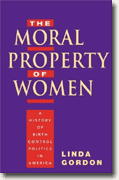The Moral Property of Women
R.J.B. Bosworth
book reviews:
· general fiction
· chick lit/romance
· sci-fi/fantasy
· graphic novels
· nonfiction
· audio books
· author interviews
· children's books @
curledupkids.com
· DVD reviews @
curledupdvd.com
newsletter
win books
buy online
links
home
for authors
& publishers
for reviewers

 |
The Moral Property of Women: A History of Birth Control Politics in America Linda Gordon University of Illinois Press Paperback 464 pages March 2007 |
|
Billed as “the most complete history of birth control ever written” and subtitled “A History of Birth Control Politics in America,” this academic tome has much territory to cover. The author, Linda Gordon, is a history professor at New York University with prize-winning books already to her credit (The Great Arizona Orphan Abduction won the Bancroft and Beveridge Prizes).
Standing against the right to birth control were people who sought to control all women’s impulses, including the right to vote. Feminists have always understood this, have always known that reproductive freedom is tantamount to political will. As Gordon states, “reproduction control has been influential in the development of feminist thought about what ‘rights’ are or can be” in general. Since birth control methods have always been largely the purview of women it is women’s needs that have driven the advances in the science. Is there any drug company seriously working to develop a male contraceptive pill? Most men laugh at the idea. The diaphragm was an ideal method in its day, though considered elitist since clean bathrooms and literacy skills were required to use it properly. The sponge was simple and more egalitarian. Condoms work well. None of these methods however, were as reliable as the pill, a no-nonsense intervention that required no embarrassing pause in the sexual choreography. Then came patches and injections, making contraception easier still, if women were prepared for the side effects. Now science is touting a better pill, one that will simply put an end to menstruation. The best thing about such “good drugs” is that they hold out the alluring potential for women to act on the stage of work and career in parity with men. While many women want to emphasize their maternal and home-keeping nature, many, especially in the west/north of the planet, want the freedom to work without being tied to cradle and hearth. Birth control - and especially abortion, which has to be considered a pretty effective method of birth control - have emerged over time as major civil liberty issues, and neither the liberals nor the conservatives can claim the high ground. Pro-lifers believe they are guarding the lives of the unborn, and Planned Parenthood and other pro-choice organizations believe that they are improving the lives of the living. Having smaller families, having sex earlier and earlier, deciding whether to have a genetically disabled child - these are not just current social norms, they are also social pressures whose dynamics have to be considered. Gordon looks at these issues as objectively and thoroughly as anyone probably could, given the intense passions that fire the birth control debate. According to Gordon, the most salient fact at the core of the debate is this: “birth control is inevitably about gender.” Originally published on Curled Up With A Good Book at www.curledup.com. © Barbara Bamberger Scott, 2007 |
|
|
|
 Click here to learn more about this month's sponsor! |
|
| fiction · sf/f · comic books · nonfiction · audio newsletter · free book contest · buy books online review index · links · · authors & publishers reviewers |
|
| site by ELBO Computing Resources, Inc. | |
 The book begins by declaring “There is no ‘natural’ when it comes to human society.” The attempt to control birth, therefore to control nature itself, whether before, during or after the act of procreation, is as old as the proverbial hills. If it wasn’t always successful, it was generally known and accepted, until the Victorian age, when nothing was accepted that had to do with sex. It was then, in
Western culture, that birth control went in the closet and slammed the door shut, and women were forced to grin and bear. Gordon cites many case histories that prove that women who sought the services of an abortionist could be arrested. The travail of childbirth was deemed a woman’s lot. While Victorian men eagerly accessed the services of prostitutes and had little compunction about forcing themselves on the servants, women who wanted sex or needed income from the sale of their most basic commodity were disgraced. The quickest proof of sin was pregnancy, so birth control became not just a necessity but ultimately a right.
The book begins by declaring “There is no ‘natural’ when it comes to human society.” The attempt to control birth, therefore to control nature itself, whether before, during or after the act of procreation, is as old as the proverbial hills. If it wasn’t always successful, it was generally known and accepted, until the Victorian age, when nothing was accepted that had to do with sex. It was then, in
Western culture, that birth control went in the closet and slammed the door shut, and women were forced to grin and bear. Gordon cites many case histories that prove that women who sought the services of an abortionist could be arrested. The travail of childbirth was deemed a woman’s lot. While Victorian men eagerly accessed the services of prostitutes and had little compunction about forcing themselves on the servants, women who wanted sex or needed income from the sale of their most basic commodity were disgraced. The quickest proof of sin was pregnancy, so birth control became not just a necessity but ultimately a right.